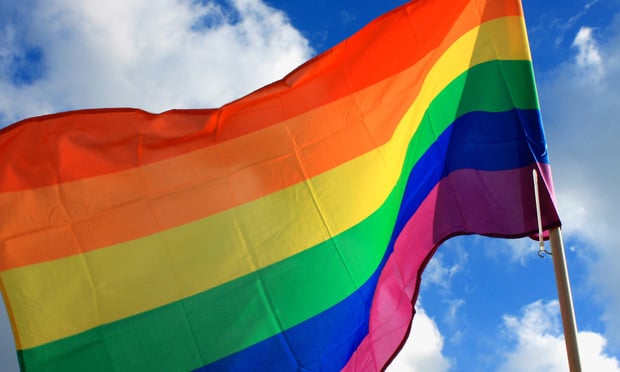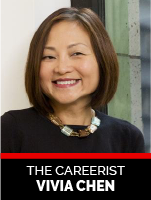Firms Love LGBT Lawyers—Restrictions Apply
LGBT lawyers have made relatively big gains at large law firms, but their progress isn't reflected in the partnership ranks.
April 09, 2020 at 01:21 PM
4 minute read
 Photo: Shutterstock.
Photo: Shutterstock.
Editor's note: This column appears in The American Lawyer's April print issue. Since it was written, the coronavirus pandemic has prompted Big Law layoffs and pay cuts. Those kinds of measures in the past have disproportionately affected women and minorities, including LGBT lawyers and staff.
Of all the groups that have faced discrimination in the legal profession, which one would you bet has gained the most traction? Well, I wouldn't put my money on women. Or lawyers of color. Here's the winner: LGBT lawyers.
 "There's no social issue that's changed as fast as gay rights, especially for those in major cities who have graduate degrees—which pretty much describes lawyers in big firms," says Keith Wetmore, the former chairman of Morrison & Foerster who came out in 1982, one of the first lawyers to do so. Wetmore, now a recruiter for Major, Lindsey & Africa, says, "It's such a nonissue when partners move laterally. Firms just care about their book of business."
"There's no social issue that's changed as fast as gay rights, especially for those in major cities who have graduate degrees—which pretty much describes lawyers in big firms," says Keith Wetmore, the former chairman of Morrison & Foerster who came out in 1982, one of the first lawyers to do so. Wetmore, now a recruiter for Major, Lindsey & Africa, says, "It's such a nonissue when partners move laterally. Firms just care about their book of business."
The pace of change stuns members of the LGBT community. "It was night and day," recalls Winston & Strawn partner Jennifer Golinveaux. "When I started practicing at a big Silicon Valley firm in 1999, I was advised not to come out for career reasons." That changed by the time she moved to Winston in 2004. Rather than a liability, being an LGBT lawyer can be a career-enhancer. "It's actually helpful with clients; it's included in the diversity metric," Golinveaux says.
Indeed, LGBT lawyers are on a roll. According to the National Association for Law Placement's 2019 diversity report, the number of LGBT lawyers in big firms continues to rise, representing 7% of all summer associates—a remarkable increase, considering that the overall figure for LGBT lawyers in 2002 was only 1%.
What's more, firms are vying for LGBT talent. In the Human Rights Campaign's latest Corporate Equality Index, an impressive 130 out of 164 firms got perfect scores for being gay-friendly. (In 2015, it was only 87 firms.)
Law firms love them. Clients love them. So why shouldn't we assume that the story of LGBT lawyers is one of unabashed success?
Here's the flip side: That progress isn't reflected in the partnership ranks. A new study by Diversity Lab and ChIPs, a women in technology and law organization, found that LGBT attorneys fared worst than women or racial minorities, with just 8% of firms hitting the 5% threshold for LGBT partner representation. (The study looked at 59 Am Law 200 firms and 14 other firms.)
"While there are increasing numbers of LGBTQ members in the associate ranks, they're not making it into the senior ranks," says D'Arcy Kemnitz, executive director at the National LGBT Bar Association.
So is the success of the LGBT community a mirage? Do LGBT members face bias as insidious or even worse than that faced by women and other minorities?
Not exactly. "Underrepresentation is not the same as discrimination," says Wetmore, adding that there might be LGBT partners who are not self-identifying as such. "There's still homophobia," he says, but, he adds, "I'm not sure it's more rampant than other types of discrimination."
"Sometimes numbers are misleading," says David Flugman, a partner at New York's Selendy & Gay, echoing Wetmore's point. A former partner at Kirkland & Ellis, Flugman says he's been open about his sexuality since college: "There's a generational divide. I'm 38, I grew up with DOMA, and I saw my LGBT identity as a value proposition."
The LGBT community has arguably gained acceptance in Big Law in ways that women and minorities have not. Unlike women, LGBT lawyers' ambition and commitment aren't called into question. And unlike racial minorities, they're not saddled with crippling stereotypes about their abilities or leadership qualities.
Which brings up what's often ignored: The LGBT community is a diverse ecosystem, and some members still face daunting challenges.
"People shouldn't judge the progress of the LGBT community based on the success of LGBT white men," Flugman cautions. "There are vastly different experiences among the LGBT community."
There's another part of the LGBT equation that's seldom discussed: the transgender community. Many gays and lesbians struggle to understand transgender individuals, Wetmore says, "which is ironic, given that we should know what it's like to be marginalized."
Contact Vivia Chen at [email protected]. On Twitter: @lawcareerist.
This content has been archived. It is available through our partners, LexisNexis® and Bloomberg Law.
To view this content, please continue to their sites.
Not a Lexis Subscriber?
Subscribe Now
Not a Bloomberg Law Subscriber?
Subscribe Now
NOT FOR REPRINT
© 2025 ALM Global, LLC, All Rights Reserved. Request academic re-use from www.copyright.com. All other uses, submit a request to [email protected]. For more information visit Asset & Logo Licensing.
You Might Like
View All
Change Is Coming With the New Trump Era. For Big Law, Change Is Already Here
6 minute read


Letter From London: 5 Predictions for Big Law in 2025, Plus 5 More Risky Ones
6 minute readLaw Firms Mentioned
Trending Stories
- 1Some Thoughts on What It Takes to Connect With Millennial Jurors
- 2Artificial Wisdom or Automated Folly? Practical Considerations for Arbitration Practitioners to Address the AI Conundrum
- 3The New Global M&A Kings All Have Something in Common
- 4Big Law Aims to Make DEI Less Divisive in Trump's Second Term
- 5Public Notices/Calendars
Who Got The Work
J. Brugh Lower of Gibbons has entered an appearance for industrial equipment supplier Devco Corporation in a pending trademark infringement lawsuit. The suit, accusing the defendant of selling knock-off Graco products, was filed Dec. 18 in New Jersey District Court by Rivkin Radler on behalf of Graco Inc. and Graco Minnesota. The case, assigned to U.S. District Judge Zahid N. Quraishi, is 3:24-cv-11294, Graco Inc. et al v. Devco Corporation.
Who Got The Work
Rebecca Maller-Stein and Kent A. Yalowitz of Arnold & Porter Kaye Scholer have entered their appearances for Hanaco Venture Capital and its executives, Lior Prosor and David Frankel, in a pending securities lawsuit. The action, filed on Dec. 24 in New York Southern District Court by Zell, Aron & Co. on behalf of Goldeneye Advisors, accuses the defendants of negligently and fraudulently managing the plaintiff's $1 million investment. The case, assigned to U.S. District Judge Vernon S. Broderick, is 1:24-cv-09918, Goldeneye Advisors, LLC v. Hanaco Venture Capital, Ltd. et al.
Who Got The Work
Attorneys from A&O Shearman has stepped in as defense counsel for Toronto-Dominion Bank and other defendants in a pending securities class action. The suit, filed Dec. 11 in New York Southern District Court by Bleichmar Fonti & Auld, accuses the defendants of concealing the bank's 'pervasive' deficiencies in regards to its compliance with the Bank Secrecy Act and the quality of its anti-money laundering controls. The case, assigned to U.S. District Judge Arun Subramanian, is 1:24-cv-09445, Gonzalez v. The Toronto-Dominion Bank et al.
Who Got The Work
Crown Castle International, a Pennsylvania company providing shared communications infrastructure, has turned to Luke D. Wolf of Gordon Rees Scully Mansukhani to fend off a pending breach-of-contract lawsuit. The court action, filed Nov. 25 in Michigan Eastern District Court by Hooper Hathaway PC on behalf of The Town Residences LLC, accuses Crown Castle of failing to transfer approximately $30,000 in utility payments from T-Mobile in breach of a roof-top lease and assignment agreement. The case, assigned to U.S. District Judge Susan K. Declercq, is 2:24-cv-13131, The Town Residences LLC v. T-Mobile US, Inc. et al.
Who Got The Work
Wilfred P. Coronato and Daniel M. Schwartz of McCarter & English have stepped in as defense counsel to Electrolux Home Products Inc. in a pending product liability lawsuit. The court action, filed Nov. 26 in New York Eastern District Court by Poulos Lopiccolo PC and Nagel Rice LLP on behalf of David Stern, alleges that the defendant's refrigerators’ drawers and shelving repeatedly break and fall apart within months after purchase. The case, assigned to U.S. District Judge Joan M. Azrack, is 2:24-cv-08204, Stern v. Electrolux Home Products, Inc.
Featured Firms
Law Offices of Gary Martin Hays & Associates, P.C.
(470) 294-1674
Law Offices of Mark E. Salomone
(857) 444-6468
Smith & Hassler
(713) 739-1250










